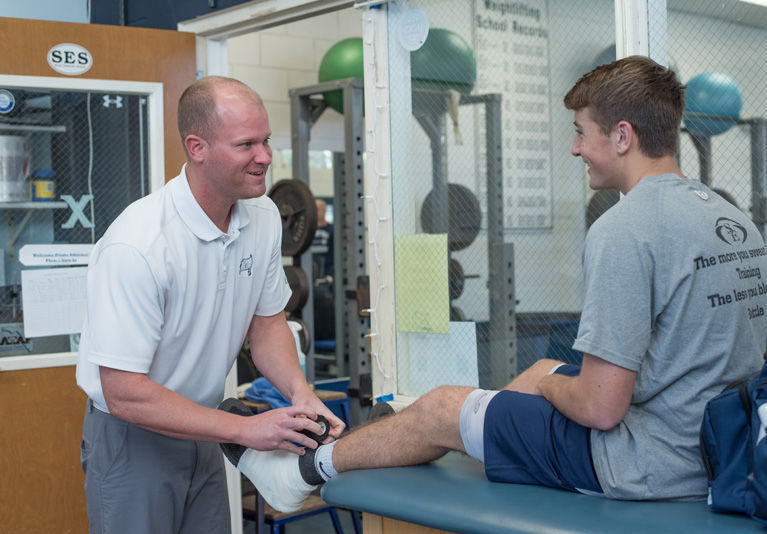
Athletic Trainer Jeremy Gillan arrived at St. Ed’s at the beginning of this school year as a direct result of striking up a casual conversation with his predecessor.
“I met Lisa Weiss last year when Jupiter Christian hosted St. Edward’s in football,” Gillan recalled. “I always liked to go over and introduce myself to the other athletic trainer when we had a home event. I wanted to determine if they needed anything because our lives can be hectic on football Friday nights. Sometimes you forget some tape or something that you might need during the game.”
From that conversation Gillan learned that he had more in common with Weiss than a shared profession.
“Lisa was in PT (Physical Therapy) school and my wife had just graduated from the same school,” Gillan explained. “Her husband worked in baseball (trainer for Tampa Bay Rays) and I had just retired from baseball. Then we talked about our educational backgrounds and discovered that we went to the same graduate school.
“She told me she was thinking about going back to school full time and would have to leave St. Edward’s. I told her I would be interested in the position because it was closer to home and I already knew a little bit about the St. Edward’s family.”
The networking paid off for both. The highly regarded Weiss departed for a full-time push in graduate school and Gillan departed Jupiter Christian to become the full-time Athletic Trainer for the Pirates.
“I appreciate how easy the transition really was,” Gillan said. “It’s a family here, so everyone – the administration, faculty and staff – is on the same page and we work together as a team.
“The hardest part as an Athletic Trainer, especially in the first year, is gaining the trust of everyone you are working with. I feel that trust is earned, not given. The faculty and parents want to get to know you and have confidence that their kids are in the hands of someone who truly cares about their well-being.
“But the most crucial part of athletic training is earning the trust of the students you are working with every day. That’s what I look forward to.
“The highlight of my day is learning about the things these students do both inside and outside of school. I want to learn about them as individuals, not just as athletes. I want them to know that they can trust coming to me with problems, athletic or otherwise. My door is always open.”
The relationship between trainer and athlete is by definition very close at times and the trust factor that Gillan cited will always be judged on a person-to-person basis. On other issues, however, Gillan had a very solid foundation to work with based on the legacy of Lisa Weiss. She left much behind that Gillan could build upon, including a system to identify and treat concussions.
“It is a hot topic that we have to take a greater look at,” Gillan said. “The research is evolving and we have to stay on top of that. There is always room for improvement, but what we have going on here with our protocols and procedures is working effectively.
“We establish a baseline for cognitive functioning with an athlete in the preseason. When a [head injury] occurs, we use that tool in conjunction with the expertise of local medical personnel when advising athletes and their parents about returning to the field. The coaches are also being educated on the causes of head trauma and how it can affect the person further down the road.
“This is an important subject and I believe we are moving in the right direction.”
Gillan’s connection to sports clearly extended beyond the physiology of the human anatomy when he mentioned that he retired from baseball.
“Obviously a lot of kids playing sports have dreams and aspirations to play at the highest level,” Gillan said. “I was fortunate enough to make that happen. I played baseball at Jacksonville University and was drafted by the Los Angeles Angels. I got to travel the world and play baseball year round.
“But there are ups-and-downs in almost anything that you do in life. The glamourous side of it was of course playing baseball. The not so glamourous side that most people don’t realize was the 15 hour bus rides and the long amounts of time away from home.
“The worst story that I can say about playing baseball was coming home after my first year in professional baseball and my dog didn’t recognize me.
“I didn’t quite make it to the major leagues, but the chances of getting there are very slim. I realized that an education was way more important, so I decided to go back and complete my senior year and get my degree.
“I knew that I could help student-athletes because I had been in their shoes. I know what it takes to be successful on and off the field. I’ve always wanted to work with young student-athletes and help further their careers. That’s why I do this.
“I love my job here at St. Edward’s. I wouldn’t trade it for anything.”



